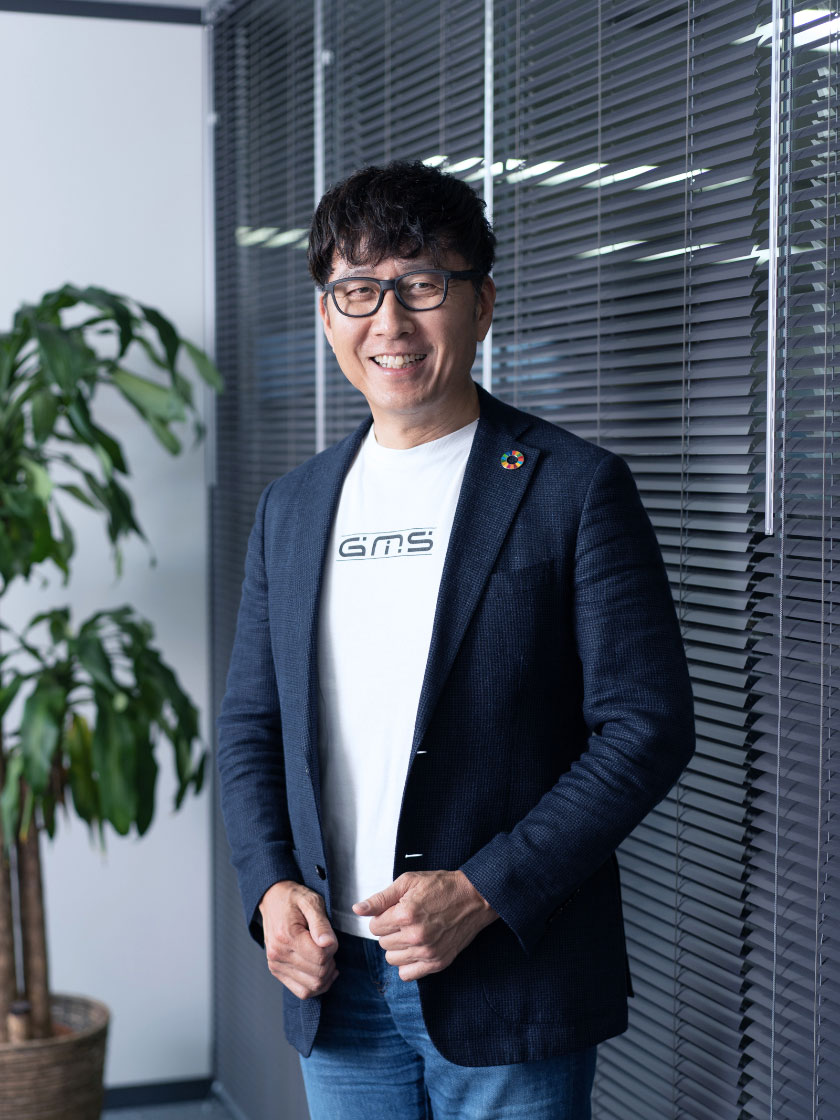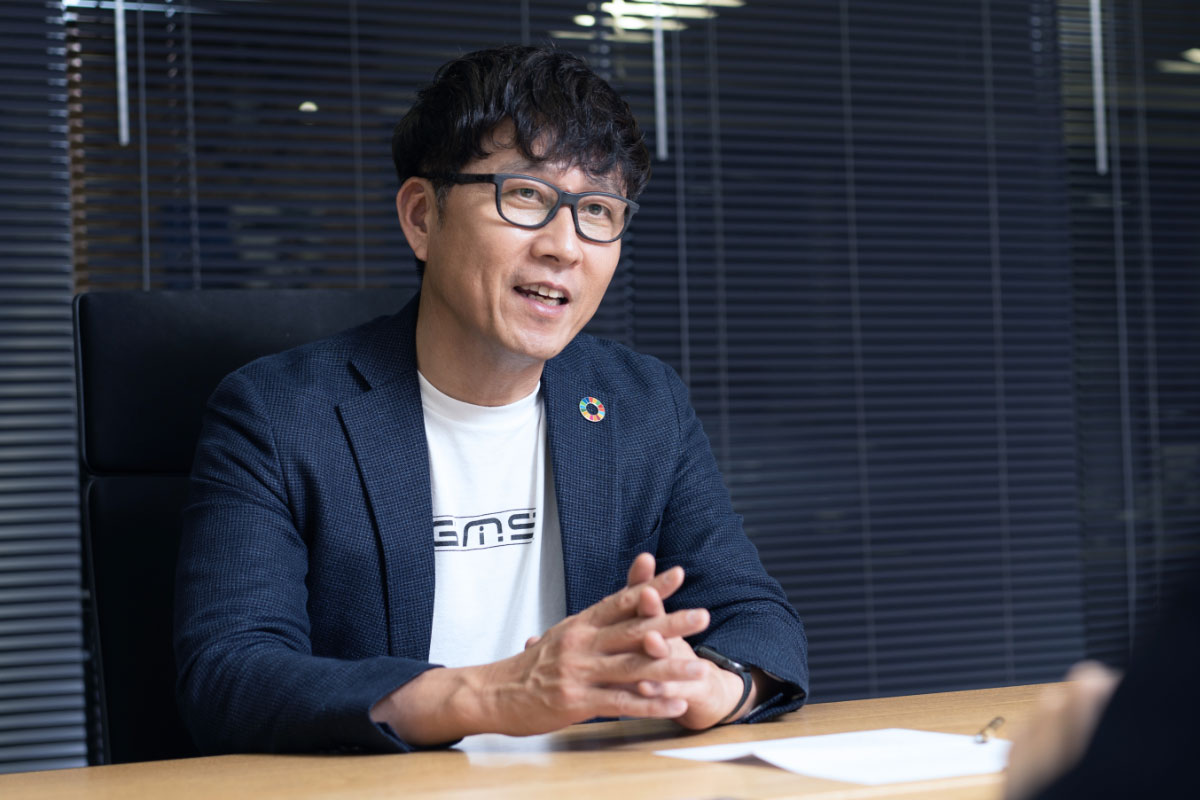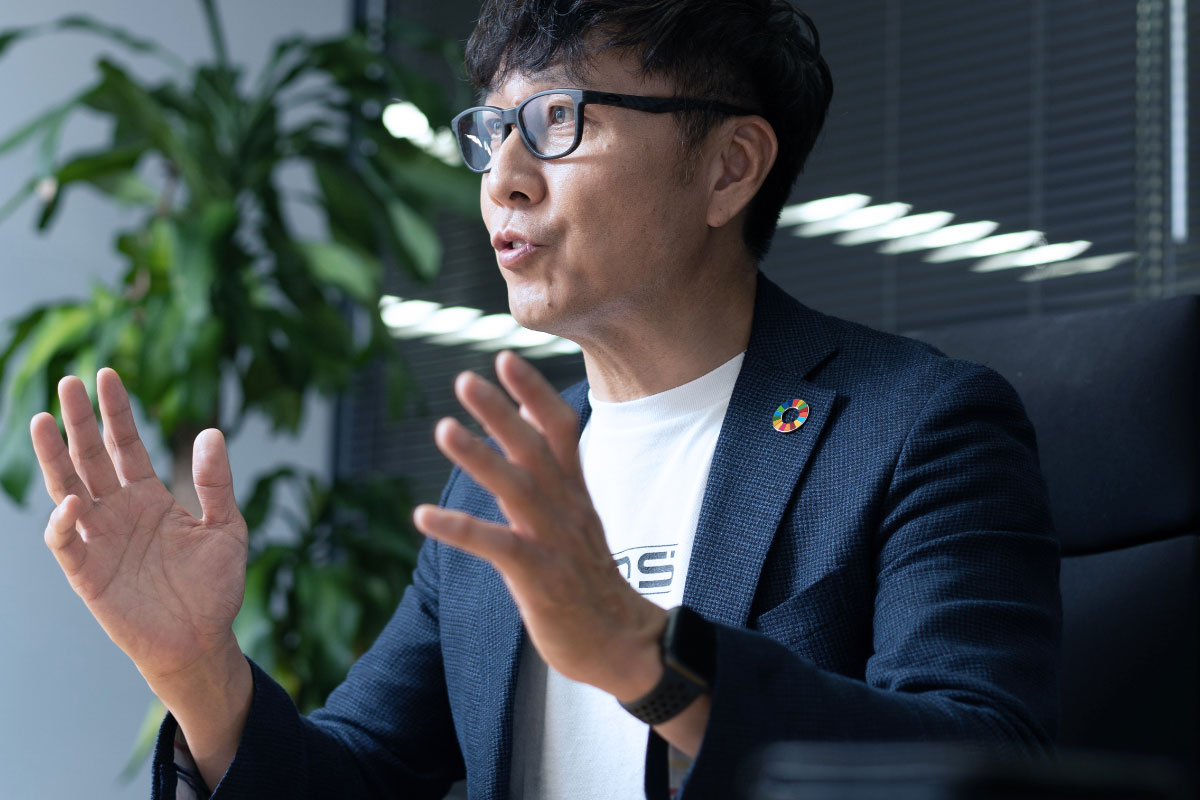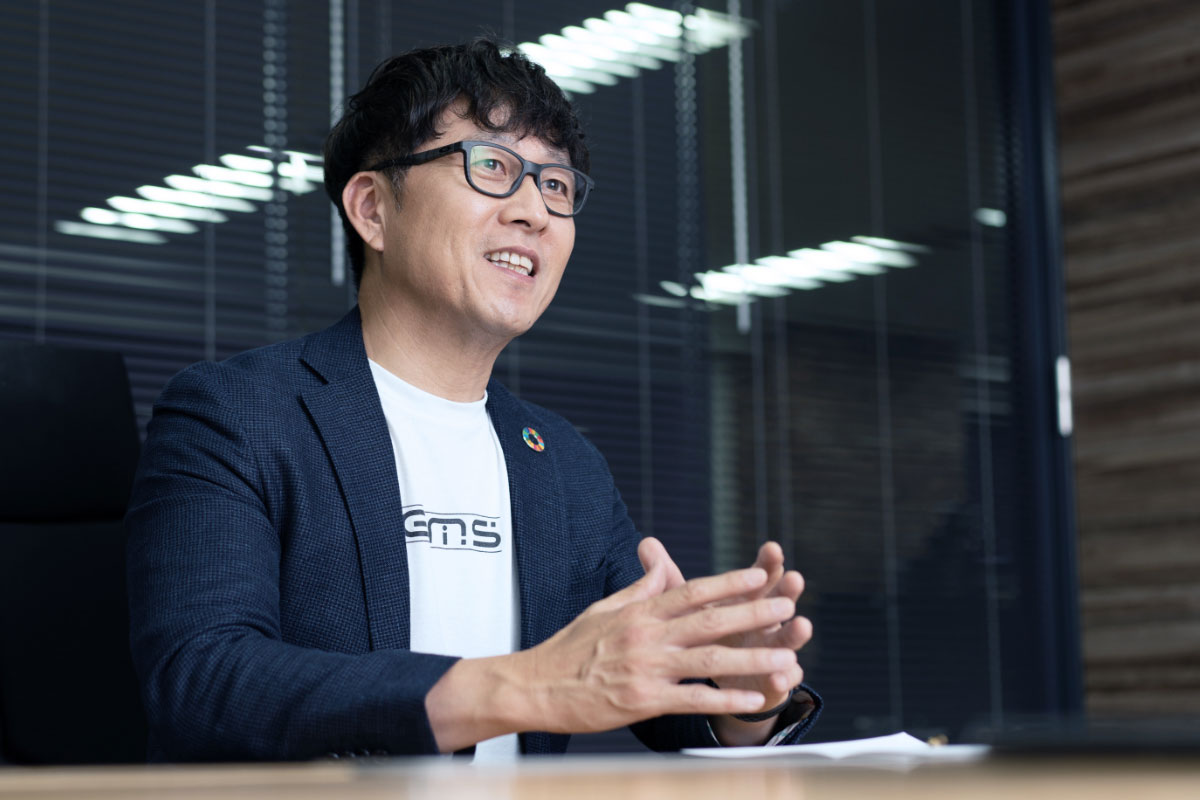SBI truly understood the importance of people’s happiness throughout the provision of financial services and believed in our vision.

Global Mobility Service Inc.
Could you tell us about your background and why you decided to found your business?
I have founded three companies up to today. The first and second companies are related to electric vehicle (EV) manufacturing, and the third company is Global Mobility Service Inc. Our company aims to improve the creditworthiness for people who were previously ineligible for car financing and to enhance their livelihoods. We achieve this mission by providing a platform that analyzes mobility data derived from IoT devices on automobilities as well as financial data.
My first company, Zero Sports Co., Ltd., was an EV startup that was once comparable to Tesla in the U.S. At that time, we received an unprecedented order for 1,030 EV delivery vehicles, but the delivery contract was cancelled and we were forced to sell our business. After that, I led the commercialization of EVs at Uzushio Electric Co., Ltd., who acquired our business, then established BEET Philippine Inc., which was a subsiary venture in the Phillipines. This was my second EV startup.
Similar to the first company, we were working to grow the EV market, aiming to achieve a low-carbon society. However market research revealed that most people in the country were unable to access financial services to purchase EVs such as loans and leases. This was a wake-up call for me and realized that unless we create an environment where people can purchase EVs, we would not be able to resolve global air pollution or noise pollution issues, nor creating new employment base from the EV industry.
While I was CEO of my second EV startup, I promised to develop technologies and to create a commercial market. After I achieved my targets and was stepping down my CEO role to return to HQ, I wanted to create an ecosystem to enable low-income people to purchase cars and enhance their livelihoods instead of heading back to HQ. With the blessing of the HQ, I left the company and founded a new company in November 2013.
I founded my company with the philosophy of "Making people happy throughout the provision of mobility services.”

What was your driving force to restart after selling your firs company?
At that time I was fully filled with regret, but the reason to restart was simple. I believed that I had responsibility to become successful and repay to those who had supported my first venture journey, even if it was in a different form.
The EV startup that I founded would not have been needed if it was served by large companies or other EV startups. There will surely come a time when EVs become crucial part of the society, but if we are not prepared for it, we will be left behind by global trends and we will not be able to protect our automobile and manufacturing industries which play significant roles in the Japanese economy. I strongly believe that an entrepreneur has a mission to prosper society throughout his or her business, so it felt like my mission to do it if no one else wants to do it. When I started my first company, many people agreed with our ideas and invested in the company with high hopes. We ended up selling our business, but we did everything we could. If I rotted and stopped here, I would never be able to face to the investors and partners who had helped me grow.
I have had a lot of hard, excruciating times throughout my journey, but I do believe that I must repay to those who believed and supported me – this strong desire has kept me going and pushed me to where I am today. Although the nature of our current business differs from the previous businesses, my mission to address social challenges remains the same.

What kind of difficulties have you faced since you started your current company?
Our company has gone through many difficulties during the last seven years of our journey. These difficulties were mainly related to three areas: raising funds, business development, and technological development. Funding was particularly difficult because our business model had never existed before.
SBI made first investment in our Series A round back in 2015 and made follow-on investment in our Series B round in 2016. Back in our Series A round, there were very little VCs in Japan who understood our business model because financial companies serving low-income segments was extremely rare at the time. SBI truly understood the future of financial services. Among all of the investors, SBI understood the importance of people’s happiness throughout the provision of financial services and believed in our vision.
Why did you choose SBI as an investor?
A major reason was that a General Manager overseeing the investment, Mr. Matsumoto, and other members of the senior management showed understanding of our business.
At that time, fintech was mostly focused on digitizing the exisiting legacy financial system, aiming to provide faster, cheaper, and more convenient services to customers who already had access to finance. We were one of the few companies in the world looking to achieve social digital transformation through fintech. Our business has now garnered attention, but back then, we had limited publicity was quite vulnerable at the time of Series A. Under such circumstances, Mr. Matsumoto saw the future potential of our business, and persuaded the internal team to invest in us. His passion was the hole card for us to welcome SBI as our investor.

What kind of support was helpful post-investment?
We are very grateful that SBI provided us with many possibilities and paved the way for our growth. SBI introduced us to SBI Social Lending Co., Ltd., which is our key business partner, regional banks, and venture capital funds and other corporates that would become potential investors in each funding round. Mr. Matsumoto, General Manager, and other members of the senior management also supported us during due diligence interviews by these potential investors. In the ongoing COVID-19 pandemic, not just funding support but we have received countless advices and support that deemed necessary at each stage.
What is your outlook for the future?
The aim of our business is not just to provide cars to drivers. For drivers, cars are one of the important elements to achieve prosperity in life. By visualizing how drivers work and making it as one of the valueable factos to assess their creditworthiness, provide processed scoring data to financial institutions we hope to provide the fundamental quality of life that drivers require, such as housing loans and educational loans.
Economist Muhammad Yunus founded the Grameen Bank, and was awarded the Nobel Peace Prize in 2006 for providing unsecured microcredit to about four million people in low-income areas. In the analog era of the 20th century, that's still great, and it's important to provide them with funds to pay for the cost of living. But with this alone, low-income groups will remain suffering from poverty. In the digital age of the 21st century, we need to eliminate poverty and push these people to covert into the middle class, as also been called out by SDGs. To achieve this, financial power is necessary, and this is the responsibility of fintech companies. In the digital age, I’m sure we can help tens of millions, even hundreds of millions of people. To drive the creation of such society, by 2030, our company aims to provide financing to 100 million people through our services. To this end, we must take various measures, including alliances with financial institutions and an IPO so that we can accelerate business development over the next 10 years.

What do you value as a CEO?
Taking the business very seriously and dedicate to my fullest. I think that when you get to my age, around 40s or 50s, you start to thinking about challenges you faced while you were struggling to get through each day, and desire to accomplish something. I try to achieve my aspirations through our businesses and this is only possible with great amount of valuable time and shared knowledge by people who support us, and that is why I need to take the business very seriously and dedicate to my fullest. Of course, there are times when things go well and there are times when things don't, but if you forget how you take your business seriously and your dedicated attitude, you will lose the trust of your stakeholders. There is a variety of external factors so it may be difficult to progress everything smoothly, but I believe it is important to devote a fair amount of attention to maintaining relationships of trust with stakeholders. Chairman Kitao often says "sincerity, righteousness, and benevolence", and I think valuing the trust of stakeholders is exactly what he says.
Do you have any advice for young entrepreneurs or entrepreneurs in general who will start a business in future?
It's important to find good business partners who will stay with your business. You can't grow a company by yourself. If you are fortunate enough to have a relationship like we have with SBI Investment, you will surely gain a lot from working with that partner.
Also, I don't think the fintech boom came by coincidentally. The SBI Group's passion for fintech was extraordinary which was back in 2015. I think that what we have in the world today is thanks to the long-term perspectives by investors and support that fintech startups have received including us. As entrepreneurs, I think it is important for us to create the world from a long-term perspective.
It's also important to have a strong will and build your own foundations so that you can convey to others. No matter how much you try to explain and convince others of your will, without these foundations, it will still appear "wobbly.” So, whether it's work or study, you should focus all your efforts on your current endeavors in the environment you're in, without running away from what's in front of you. Entrepreneurs need to be trusted and have others work for them, even if they have not achieved anything yet. I think it is important to think about what to build and how you will build it, until you get to the point where your will is solidified.

- Company name
- Date of establishment
-
November 2013
- Main businesses
-
Provision of fintech services leveraging IoT devices and mobility service platforms that enable remote control for autombiles.